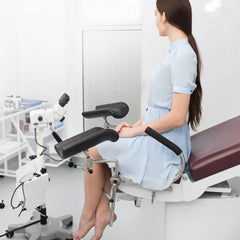Reproductive Health Screenings and Preventive Care for Women: Promoting Well-being and Empowering Choices
Reproductive health is an integral component of overall well-being, and proactive measures for preventive care play a crucial role in promoting women's health. Reproductive health screenings and preventive care services are essential in the early detection and prevention of reproductive health issues, including sexually transmitted infections (STIs), cervical and breast cancers, and infertility. This blog discusses the importance of reproductive health screenings and preventive care for women, emphasizing the significance of regular check-ups and screening tests in maintaining optimal reproductive health.
Cervical Cancer Screening
Cervical cancer is a common reproductive health concern affecting women worldwide. Regular Pap test screenings (or Pap smear) can identify precancerous changes in the cervix, allowing for early detection, intervention, and treatment. The American College of Obstetricians and Gynecologists

(ACOG) recommends that women begin cervical cancer screening at age 21 and undergo regular screenings every three years or a combination of Pap and HPV testing every five years starting at age 30 (ACOG, 2020). Timely screenings can significantly reduce the mortality rate associated with cervical cancer (ACOG, 2020).
Breast Cancer Screening
Breast cancer is another major reproductive health issue that affects women. Early detection through mammography and regular breast self-examinations can significantly improve survival rates. The American Cancer Society (ACS) recommends annual mammograms starting at age 40 and continuing as long as a woman is in good health (ACS, 2022). Additionally, clinical breast exams by healthcare professionals are recommended every one to three years for women in their 20s and 30s and annually for women aged 40 and above (ACS, 2022).
STI Screening and Prevention
Sexually transmitted infections pose a significant risk to reproductive health. Regular screening for STIs, such as chlamydia, gonorrhea, syphilis, and HIV, is vital for early detection and treatment. The Centers for Disease Control and Prevention (CDC) recommend annual chlamydia and gonorrhea screenings for sexually active women under 25 or older women with risk factors (CDC, 2021). Routine HIV screening is recommended for all individuals aged 13 to 64, and more frequent testing is advised for high-risk populations (CDC, 2021).
Reproductive Health Counseling and Family Planning
Preventive care for reproductive health encompasses more than just screenings. Reproductive health counseling provides women with essential information regarding contraception methods, family planning, and preconception care. This counseling allows women to make informed decisions about their reproductive health, including family planning. It prepares them for a healthy pregnancy and childbirth. The ACOG recommends preconception care for all women of reproductive age to optimize their health before conception and reduce the risk of adverse pregnancy outcomes (ACOG, 2019).
Conclusion
Reproductive health screenings and preventive care are essential for women's overall well-being and quality of life. Regular screenings for cervical and breast cancers can facilitate early detection and intervention, improving survival rates. STI screenings are crucial in preventing the spread of infections and reducing long-term health complications. Additionally, reproductive health counseling empowers women to make informed choices regarding contraception and family planning, promoting healthy pregnancies and birth outcomes.
Women can take proactive measures to maintain their reproductive health by prioritizing reproductive health screenings and preventive care. Adhering to recommended screening guidelines and engaging in open discussions with healthcare professionals can help identify potential issues and ensure appropriate interventions. Moreover, education and awareness initiatives should be promoted, encouraging women to prioritize their reproductive health and avail themselves of preventive care services.







